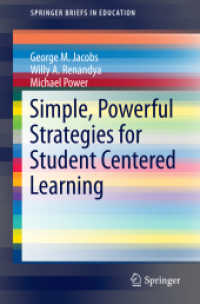- ホーム
- > 洋書
- > 英文書
- > Religion / Ethics
Full Description
Presenting cutting edge research on how religion can confront and obscure social inequalities in everyday life, Religion, Equalities and Inequalities argues that when religion is left out of social scientific analyses, it can result in incomplete analyses that conceal pathways to social inclusion and exclusion. Bringing together an international and interdisciplinary group of contributors who operate at the vanguard of theoretical and empirical work on how social structures of power, institutions and bodies can generate equalities and inequalities in religion, the collection shows how religion can enable and challenge the inequities that affect people's everyday lives. Academics and students of religious studies, sociology, politics and social policy will all find this book offers useful insights into the relationship between religion and contemporary culture.
Contents
Introduction: religion, equalities, and inequalities, Sonya Sharma and Dawn Llewellyn. Part 1 Structures: Between a rock and a hard place: negotiating religious voices in public spaces, Elaine Graham; Blessing the rich, damning the poor, and forgetting the social: divine apologetics for class inequality and the study of religion in a neoliberal age, Sean McCloud; A European perspective on religion and welfare: contrasts and commonalities, Grace Davie; Ethno-religious assertiveness out of racial equality, Tariq Modood; Causes of the Dutch multicultural reversal: a cautionary tale about being too democratic in the media age, David Herbert. Part 2 Institutions: Resistant, reluctant or responsible? The negotiation of religious and cultural plurality in Canadian healthcare, Sheryl Reimer-Kirkham and Marie Cochrane; Designing equality: multifaith space as social intervention, Andrew Crompton and Chris Hewson; Religion and belief, equality and inequality in UK Higher Education, Paul Weller and Tristram Hooley; Without fear or favour: equality and diversity in the treatment of religions and beliefs in religious education in England, Denise Cush; Still a challenge for us all? Runnymede trust, islamophobia and policy, Chris Allen; Australian born Muslims: the emergence of political project identities, Joshua M. Roose; Minoritisation and global religious activism: Pentecostals and Ecumenicals confronting inequality in politics and culture, Joanildo Burity. Part 3 Lived Experiences: Gender, religion and new media in the Netherlands: rethinking the position of Dutch Muslims through critical multiculturalism and the post-secular, Eva Midden; English Evangelicals and the claims of equality, Anna Strhan; Complicating the whole from the position of a broken body: interactions between religion, disability, and material feminism, Chris Klassen; Domestic abuse and black-led Pentecostal Churches in the UK, Cecilia Cappel; 'I will be married in the Eyes of God': religious same-sex attracted young people reimagining their future, Luke Gahan. Concluding Remarks and Implications for Policy: reflections on religion or belief as an equality issue and a human right, David Perfect. Bibliography; Index.







